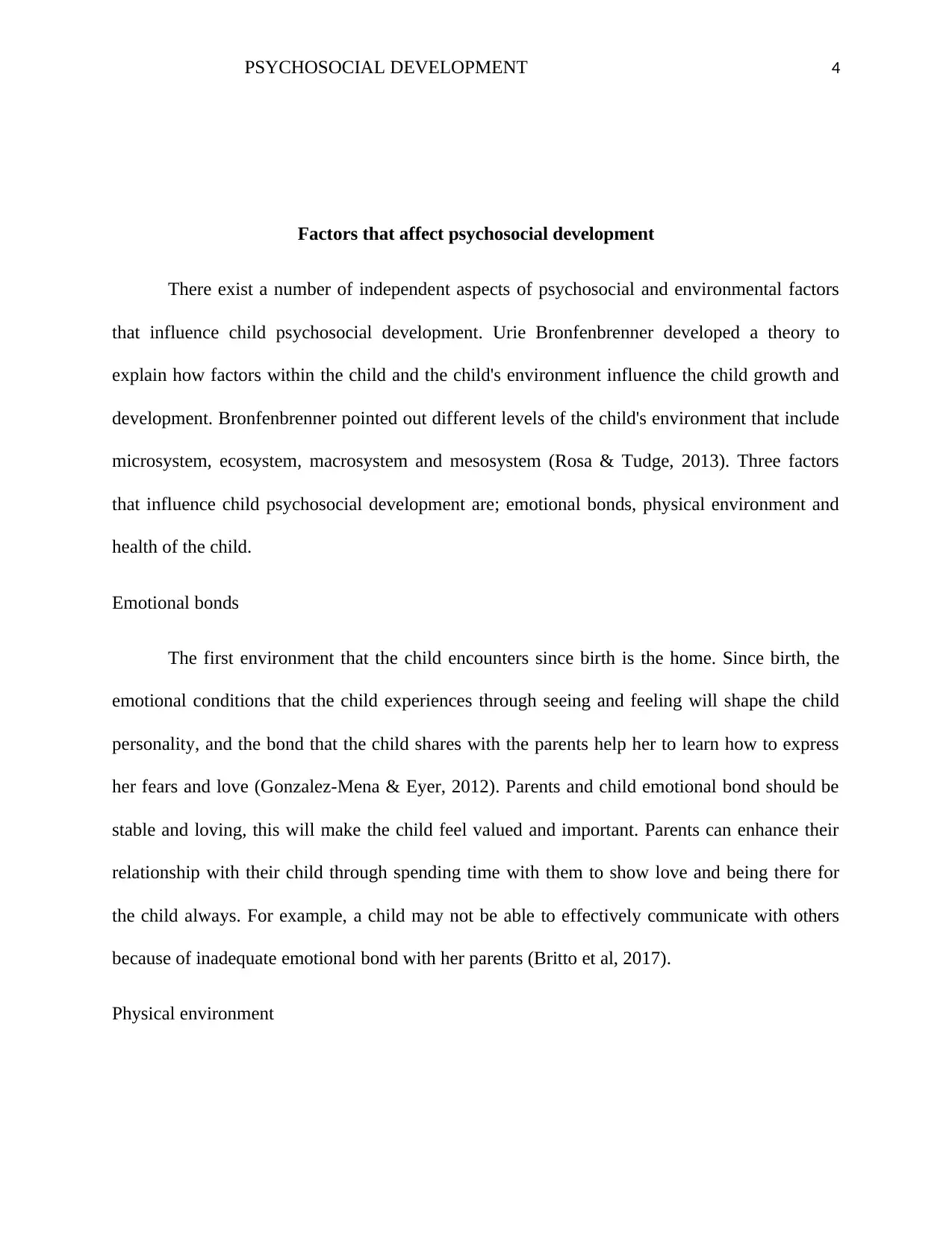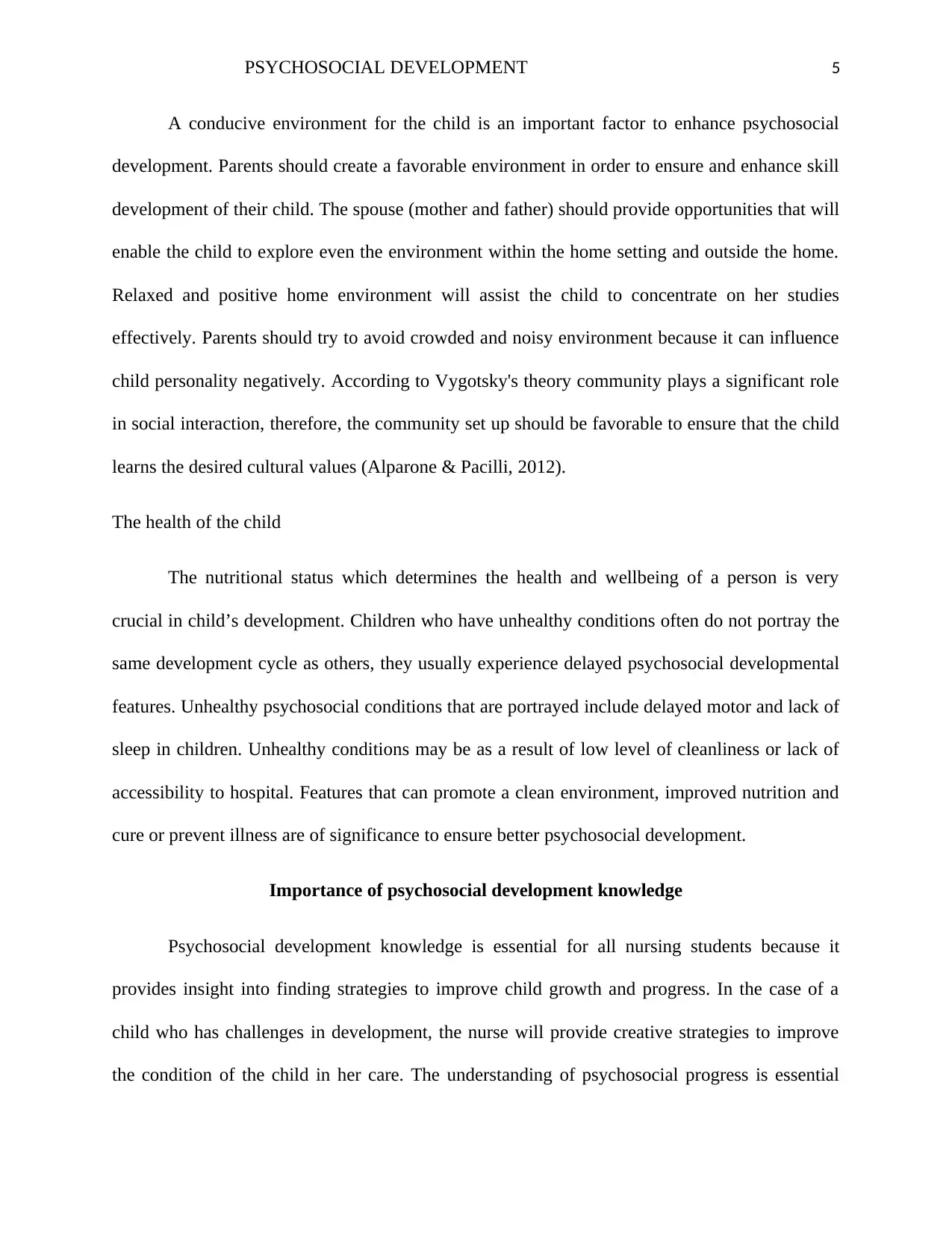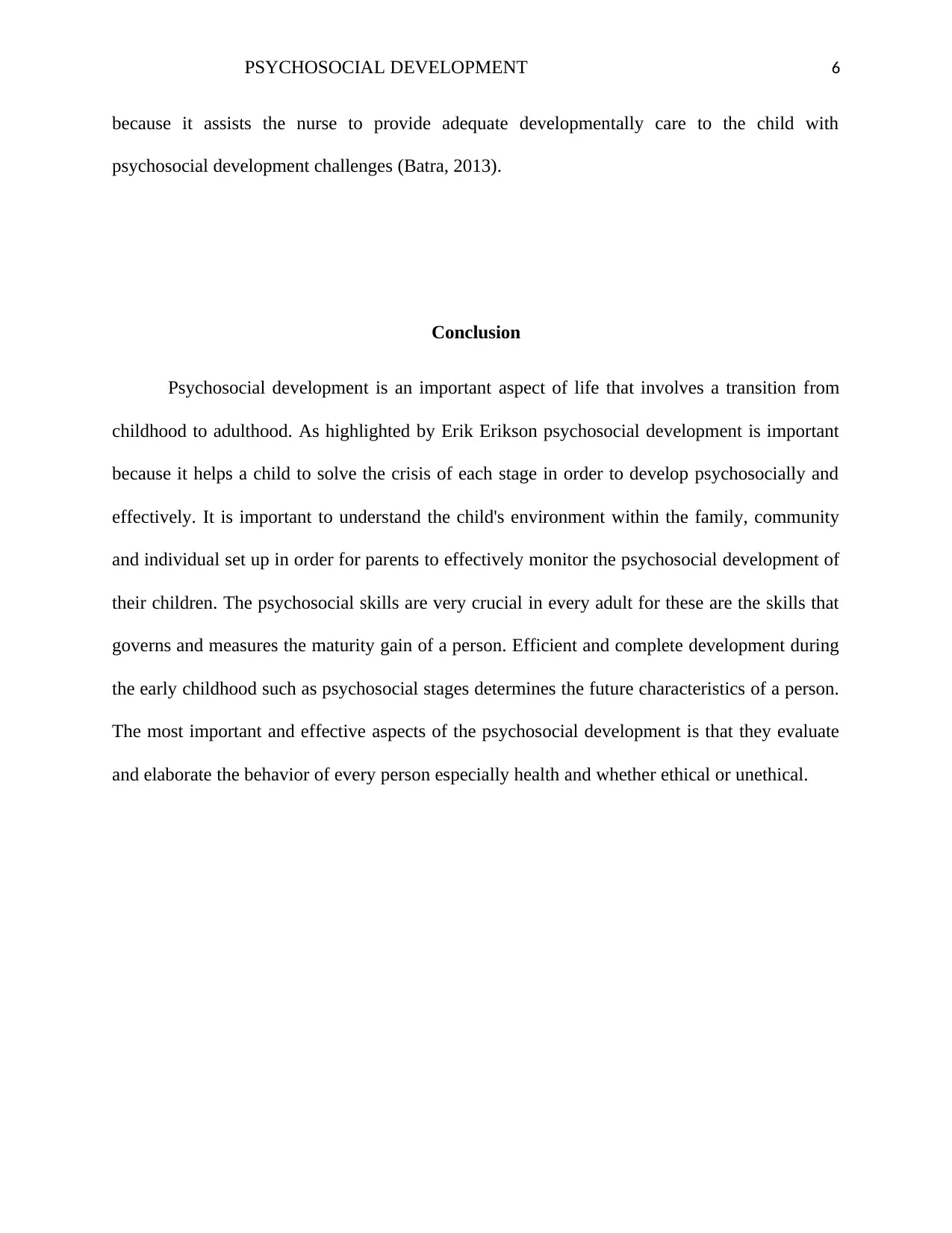Psychosocial Development of a Child
VerifiedAdded on 2023/06/08
|7
|1696
|201
AI Summary
This article discusses the psychosocial development of a child between the ages of 2-5 years. It covers the stages of development, factors affecting development, and the importance of understanding psychosocial development in nursing. The article also highlights the theories of Erik Erikson and Urie Bronfenbrenner.
Contribute Materials
Your contribution can guide someone’s learning journey. Share your
documents today.

Running head: PSYCHOSOCIAL DEVELOPMENT 1
Psychosocial Development of a Child
Student’s Name
Professor’s Name
Institution Affiliation
Date
Psychosocial Development of a Child
Student’s Name
Professor’s Name
Institution Affiliation
Date
Secure Best Marks with AI Grader
Need help grading? Try our AI Grader for instant feedback on your assignments.

PSYCHOSOCIAL DEVELOPMENT 2
Introduction
The age group between 2-5 years also known to be the pre-school years is the
developmental stage through which children develop from awkward toddlers to active
discoverers of their world. During this stage, a child develops and gains skills at his/her own
pace. Some skills develop ahead of others like motor may develop prior to sensory.
Understanding this development stage can help one to identify problems earlier and be in a
position to know more about his or her child. Frequent medical checkups for a child at the age of
2-5 years is recommendable in order to ensure that the child is growing and developing to the
best expectations. The parent or caretaker can assist the child at this development stage by
showing affection and love, offering healthy foods and teaching skills.
Psychosocial development
Psychosocial development is a continuous interaction process between the child and his
or her environment. A child undergoes psychosocial development stages from infancy to
adulthood which involves personality development and acquisition of skills and social attitudes
(Newman & Newman, 2017). Psychosocial development in children is mainly influenced by
physical growth and the environment. Brain and body transformation help in shaping children's
identity and their relationship with one another. Cognitive development is an important aspect
because it assists a child in acquiring the ability to solve problems. As in the case study, through
interaction Julie is able to communicate her needs effectively (Garbarino, 2017). The theory of
Erik Erikson is essential in understanding the psychosocial development stages. According to
Erikson, the features of understanding psychosocial development include; physical weakness and
strength, historical and cultural factors, the current development stage and life history. Erikson
Introduction
The age group between 2-5 years also known to be the pre-school years is the
developmental stage through which children develop from awkward toddlers to active
discoverers of their world. During this stage, a child develops and gains skills at his/her own
pace. Some skills develop ahead of others like motor may develop prior to sensory.
Understanding this development stage can help one to identify problems earlier and be in a
position to know more about his or her child. Frequent medical checkups for a child at the age of
2-5 years is recommendable in order to ensure that the child is growing and developing to the
best expectations. The parent or caretaker can assist the child at this development stage by
showing affection and love, offering healthy foods and teaching skills.
Psychosocial development
Psychosocial development is a continuous interaction process between the child and his
or her environment. A child undergoes psychosocial development stages from infancy to
adulthood which involves personality development and acquisition of skills and social attitudes
(Newman & Newman, 2017). Psychosocial development in children is mainly influenced by
physical growth and the environment. Brain and body transformation help in shaping children's
identity and their relationship with one another. Cognitive development is an important aspect
because it assists a child in acquiring the ability to solve problems. As in the case study, through
interaction Julie is able to communicate her needs effectively (Garbarino, 2017). The theory of
Erik Erikson is essential in understanding the psychosocial development stages. According to
Erikson, the features of understanding psychosocial development include; physical weakness and
strength, historical and cultural factors, the current development stage and life history. Erikson

PSYCHOSOCIAL DEVELOPMENT 3
outlined eight stages that portray how children develop physically, increase brain functioning
and psychomotor control as they become more complex cognitively.
The cognitive and physical changes enable children to progress psychosocially, interact
effectively with other children and form independent identities. According to Erikson
psychosocial development starts at the stage of trust versus mistrust. During this stage a child
requires security and love from the parent or initial contacts in order to create a favorable self-
security and develop a sense of trust towards oneself and others. At the age of 1-3 years, there is
a psychosocial crisis of autonomy versus doubt and shame, at this stage the child develops a
sense of favorable self-concept through associations with friends and family members. The
implications of the psychosocial development become clear when a person shows unethical
behaviors in future that he or she could have solved during developmental stages. For example, a
child who adequately receives good toilet training at the age of 12 months to 3 years may
develop a favorable self-concept and a sense of self-recognition. Self-recognition assists the
child in identifying fully with peer mates, this enhances peer interactions and reduce
embarrassment from the age of 12-18 years. Since there is no embarrassment, the individual will
develop a sense of satisfaction and voluntary control of defecation and urination. Without proper
toilet training at an early age, a child may portray complications like mistrust, stingy, not
completely developing a sense of self-awareness or grow up to be rigid adults. Parents, peers and
social childcare play significant roles in the psychosocial development of a child. Through the
interaction with parents and peers, children learn aspects of life like language, problem-solving
skills and social-emotional skills. Through the association with the child, parents are also able to
detect abnormal behavior earlier, for example in the case study Victoria is able to detect that
Julie has not mastered the toilet training skills like her age mates. (McLeod, 2013)
outlined eight stages that portray how children develop physically, increase brain functioning
and psychomotor control as they become more complex cognitively.
The cognitive and physical changes enable children to progress psychosocially, interact
effectively with other children and form independent identities. According to Erikson
psychosocial development starts at the stage of trust versus mistrust. During this stage a child
requires security and love from the parent or initial contacts in order to create a favorable self-
security and develop a sense of trust towards oneself and others. At the age of 1-3 years, there is
a psychosocial crisis of autonomy versus doubt and shame, at this stage the child develops a
sense of favorable self-concept through associations with friends and family members. The
implications of the psychosocial development become clear when a person shows unethical
behaviors in future that he or she could have solved during developmental stages. For example, a
child who adequately receives good toilet training at the age of 12 months to 3 years may
develop a favorable self-concept and a sense of self-recognition. Self-recognition assists the
child in identifying fully with peer mates, this enhances peer interactions and reduce
embarrassment from the age of 12-18 years. Since there is no embarrassment, the individual will
develop a sense of satisfaction and voluntary control of defecation and urination. Without proper
toilet training at an early age, a child may portray complications like mistrust, stingy, not
completely developing a sense of self-awareness or grow up to be rigid adults. Parents, peers and
social childcare play significant roles in the psychosocial development of a child. Through the
interaction with parents and peers, children learn aspects of life like language, problem-solving
skills and social-emotional skills. Through the association with the child, parents are also able to
detect abnormal behavior earlier, for example in the case study Victoria is able to detect that
Julie has not mastered the toilet training skills like her age mates. (McLeod, 2013)

PSYCHOSOCIAL DEVELOPMENT 4
Factors that affect psychosocial development
There exist a number of independent aspects of psychosocial and environmental factors
that influence child psychosocial development. Urie Bronfenbrenner developed a theory to
explain how factors within the child and the child's environment influence the child growth and
development. Bronfenbrenner pointed out different levels of the child's environment that include
microsystem, ecosystem, macrosystem and mesosystem (Rosa & Tudge, 2013). Three factors
that influence child psychosocial development are; emotional bonds, physical environment and
health of the child.
Emotional bonds
The first environment that the child encounters since birth is the home. Since birth, the
emotional conditions that the child experiences through seeing and feeling will shape the child
personality, and the bond that the child shares with the parents help her to learn how to express
her fears and love (Gonzalez-Mena & Eyer, 2012). Parents and child emotional bond should be
stable and loving, this will make the child feel valued and important. Parents can enhance their
relationship with their child through spending time with them to show love and being there for
the child always. For example, a child may not be able to effectively communicate with others
because of inadequate emotional bond with her parents (Britto et al, 2017).
Physical environment
Factors that affect psychosocial development
There exist a number of independent aspects of psychosocial and environmental factors
that influence child psychosocial development. Urie Bronfenbrenner developed a theory to
explain how factors within the child and the child's environment influence the child growth and
development. Bronfenbrenner pointed out different levels of the child's environment that include
microsystem, ecosystem, macrosystem and mesosystem (Rosa & Tudge, 2013). Three factors
that influence child psychosocial development are; emotional bonds, physical environment and
health of the child.
Emotional bonds
The first environment that the child encounters since birth is the home. Since birth, the
emotional conditions that the child experiences through seeing and feeling will shape the child
personality, and the bond that the child shares with the parents help her to learn how to express
her fears and love (Gonzalez-Mena & Eyer, 2012). Parents and child emotional bond should be
stable and loving, this will make the child feel valued and important. Parents can enhance their
relationship with their child through spending time with them to show love and being there for
the child always. For example, a child may not be able to effectively communicate with others
because of inadequate emotional bond with her parents (Britto et al, 2017).
Physical environment
Paraphrase This Document
Need a fresh take? Get an instant paraphrase of this document with our AI Paraphraser

PSYCHOSOCIAL DEVELOPMENT 5
A conducive environment for the child is an important factor to enhance psychosocial
development. Parents should create a favorable environment in order to ensure and enhance skill
development of their child. The spouse (mother and father) should provide opportunities that will
enable the child to explore even the environment within the home setting and outside the home.
Relaxed and positive home environment will assist the child to concentrate on her studies
effectively. Parents should try to avoid crowded and noisy environment because it can influence
child personality negatively. According to Vygotsky's theory community plays a significant role
in social interaction, therefore, the community set up should be favorable to ensure that the child
learns the desired cultural values (Alparone & Pacilli, 2012).
The health of the child
The nutritional status which determines the health and wellbeing of a person is very
crucial in child’s development. Children who have unhealthy conditions often do not portray the
same development cycle as others, they usually experience delayed psychosocial developmental
features. Unhealthy psychosocial conditions that are portrayed include delayed motor and lack of
sleep in children. Unhealthy conditions may be as a result of low level of cleanliness or lack of
accessibility to hospital. Features that can promote a clean environment, improved nutrition and
cure or prevent illness are of significance to ensure better psychosocial development.
Importance of psychosocial development knowledge
Psychosocial development knowledge is essential for all nursing students because it
provides insight into finding strategies to improve child growth and progress. In the case of a
child who has challenges in development, the nurse will provide creative strategies to improve
the condition of the child in her care. The understanding of psychosocial progress is essential
A conducive environment for the child is an important factor to enhance psychosocial
development. Parents should create a favorable environment in order to ensure and enhance skill
development of their child. The spouse (mother and father) should provide opportunities that will
enable the child to explore even the environment within the home setting and outside the home.
Relaxed and positive home environment will assist the child to concentrate on her studies
effectively. Parents should try to avoid crowded and noisy environment because it can influence
child personality negatively. According to Vygotsky's theory community plays a significant role
in social interaction, therefore, the community set up should be favorable to ensure that the child
learns the desired cultural values (Alparone & Pacilli, 2012).
The health of the child
The nutritional status which determines the health and wellbeing of a person is very
crucial in child’s development. Children who have unhealthy conditions often do not portray the
same development cycle as others, they usually experience delayed psychosocial developmental
features. Unhealthy psychosocial conditions that are portrayed include delayed motor and lack of
sleep in children. Unhealthy conditions may be as a result of low level of cleanliness or lack of
accessibility to hospital. Features that can promote a clean environment, improved nutrition and
cure or prevent illness are of significance to ensure better psychosocial development.
Importance of psychosocial development knowledge
Psychosocial development knowledge is essential for all nursing students because it
provides insight into finding strategies to improve child growth and progress. In the case of a
child who has challenges in development, the nurse will provide creative strategies to improve
the condition of the child in her care. The understanding of psychosocial progress is essential

PSYCHOSOCIAL DEVELOPMENT 6
because it assists the nurse to provide adequate developmentally care to the child with
psychosocial development challenges (Batra, 2013).
Conclusion
Psychosocial development is an important aspect of life that involves a transition from
childhood to adulthood. As highlighted by Erik Erikson psychosocial development is important
because it helps a child to solve the crisis of each stage in order to develop psychosocially and
effectively. It is important to understand the child's environment within the family, community
and individual set up in order for parents to effectively monitor the psychosocial development of
their children. The psychosocial skills are very crucial in every adult for these are the skills that
governs and measures the maturity gain of a person. Efficient and complete development during
the early childhood such as psychosocial stages determines the future characteristics of a person.
The most important and effective aspects of the psychosocial development is that they evaluate
and elaborate the behavior of every person especially health and whether ethical or unethical.
because it assists the nurse to provide adequate developmentally care to the child with
psychosocial development challenges (Batra, 2013).
Conclusion
Psychosocial development is an important aspect of life that involves a transition from
childhood to adulthood. As highlighted by Erik Erikson psychosocial development is important
because it helps a child to solve the crisis of each stage in order to develop psychosocially and
effectively. It is important to understand the child's environment within the family, community
and individual set up in order for parents to effectively monitor the psychosocial development of
their children. The psychosocial skills are very crucial in every adult for these are the skills that
governs and measures the maturity gain of a person. Efficient and complete development during
the early childhood such as psychosocial stages determines the future characteristics of a person.
The most important and effective aspects of the psychosocial development is that they evaluate
and elaborate the behavior of every person especially health and whether ethical or unethical.

PSYCHOSOCIAL DEVELOPMENT 7
Reference
Alparone, F. R., & Pacilli, M. G. (2012). On children's independent mobility: the interplay of
demographic, environmental, and psychosocial factors. Children's Geographies, 10(1),
109-122
Batra, S. (2013). The psychosocial development of children: implications for education and
society—Erik Erikson in context. Contemporary Education Dialogue, 10(2), 249-278.
Britto, P. R., Lye, S. J., Proulx, K., Yousafzai, A. K., Matthews, S. G., Vaivada, T., ... &
MacMillan, H. (2017). Nurturing care: promoting early childhood development. The
Lancet, 389(10064), 91-102.
Garbarino, J. (2017). Children and Families in the Social Environment: Modern Applications of
Social Work. Routledge.
Gonzalez-Mena, J., & Eyer, D. W. (2012). Infants, toddlers, and caregivers: A curriculum of
respectful, responsive, relationship-based care and education. New York, NY: McGraw-
Hill.
McLeod, S. (2013). Erik Erikson. Retrieved August, 9, 2013.
Newman, B. M., & Newman, P. R. (2017). Development through life: A psychosocial approach.
Cengage Learning.
Rosa, E. M., & Tudge, J. (2013). Urie Bronfenbrenner's theory of human development: Its
evolution from ecology to bioecology. Journal of Family Theory & Review, 5(4), 243-
258.
Reference
Alparone, F. R., & Pacilli, M. G. (2012). On children's independent mobility: the interplay of
demographic, environmental, and psychosocial factors. Children's Geographies, 10(1),
109-122
Batra, S. (2013). The psychosocial development of children: implications for education and
society—Erik Erikson in context. Contemporary Education Dialogue, 10(2), 249-278.
Britto, P. R., Lye, S. J., Proulx, K., Yousafzai, A. K., Matthews, S. G., Vaivada, T., ... &
MacMillan, H. (2017). Nurturing care: promoting early childhood development. The
Lancet, 389(10064), 91-102.
Garbarino, J. (2017). Children and Families in the Social Environment: Modern Applications of
Social Work. Routledge.
Gonzalez-Mena, J., & Eyer, D. W. (2012). Infants, toddlers, and caregivers: A curriculum of
respectful, responsive, relationship-based care and education. New York, NY: McGraw-
Hill.
McLeod, S. (2013). Erik Erikson. Retrieved August, 9, 2013.
Newman, B. M., & Newman, P. R. (2017). Development through life: A psychosocial approach.
Cengage Learning.
Rosa, E. M., & Tudge, J. (2013). Urie Bronfenbrenner's theory of human development: Its
evolution from ecology to bioecology. Journal of Family Theory & Review, 5(4), 243-
258.
1 out of 7
![[object Object]](/_next/static/media/star-bottom.7253800d.svg)





